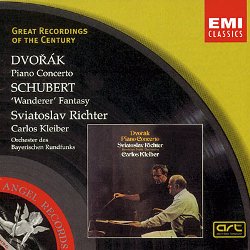Dvorak - Piano Concerto & Schubert - Wanderer Fantasy (Richter)
Dvorak - Piano Concerto & Schubert - Wanderer Fantasy (Richter)

01 – Piano Concerto in G Minor, Op. 33 – I. Allegro agitato 02 – Piano Concerto in G Minor, Op. 33 – II. Andante sostenuto 03 – Piano Concerto in G Minor, Op. 33 – III. Allegro con fuoco 04 – Fantasy in C Major, D.760 ‘Wanderer’ – I. Allegro con fuoco ma non troppo 05 – Fantasy in C Major, D.760 ‘Wanderer’ – II. Adagio 06 – Fantasy in C Major, D.760 ‘Wanderer’ – III. Presto 07 – Fantasy in C Major, D.760 ‘Wanderer’ – IV. Allegro Sviatoslav Richter – piano Bayerishes Staatsorchester München Carlos Kleiber – conductor
The rather undiscriminating enthusiasm that greets everything Richter did actually does him a disservice I believe. He was a complex personality and a complex artist. His active repertory was large, for which I am as grateful as other folk because whether he was at his best or at his most perverse we can always rely on Richter for a thinking artist's approach to whatever he chose to record. In the last resort there are not all that many pieces I would rather hear played by him than by anybody else, and when I would it's sometimes because I have hardly ever heard them done by anybody else, like this Dvorak concerto. Anyway this has to be a fine performance by any rational assessment. I have heard it said that the piano part seems to be written for a player with two right hands. These days my own piano technique is more suggestive of two left feet, so I have not tried to verify the claim. It's not a work I return to very often, but there is no mistaking the care and affection that has gone into the way Richter handles it, and he certainly persuades me that it deserves better than the critical superciliousness that it is often treated to. The Wanderer Fantasy is another proposition entirely, a truly great and profoundly original piece of music. Here I am happy to agree that we find Richter at his best and that in a work of major stature. This is a big-toned Richter, although you will hear the familiar self-communing pianissimo in the variations. His approach is basically straightforward, like Pollini's, only with far greater warmth and humanity about it. This time there is nobody I would actually prefer to Richter, but the performance that seems to me fully the equal of his is from the 20-year-old Kissin, who also has the benefit of more up-to-date sound. Kissin gives a more romantic account of the first section with more give and take in the tempo. After that it's all a matter of details when one tries to compare them. To appreciate Richter at his true greatest, as in say Schumann's C major Fantasy or the Britten concerto or some of his Chopin and much of his Debussy or on this disc I suggest that we need to think more critically about things like his travesty, albeit a thoughtful one, of the Appassionata and ask ourselves whether there are not really a number of different Richters. I think that his final greatness really lies in his profound humanity not in some supposed demigod status. Anyway I am only too happy to join in recommending this disc. --- DAVID BRYSON (Glossop Derbyshire England)








